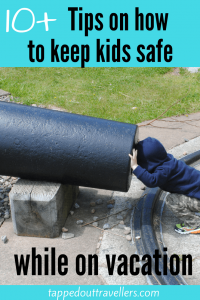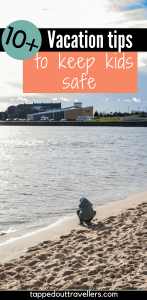Last Updated: March 25, 2018
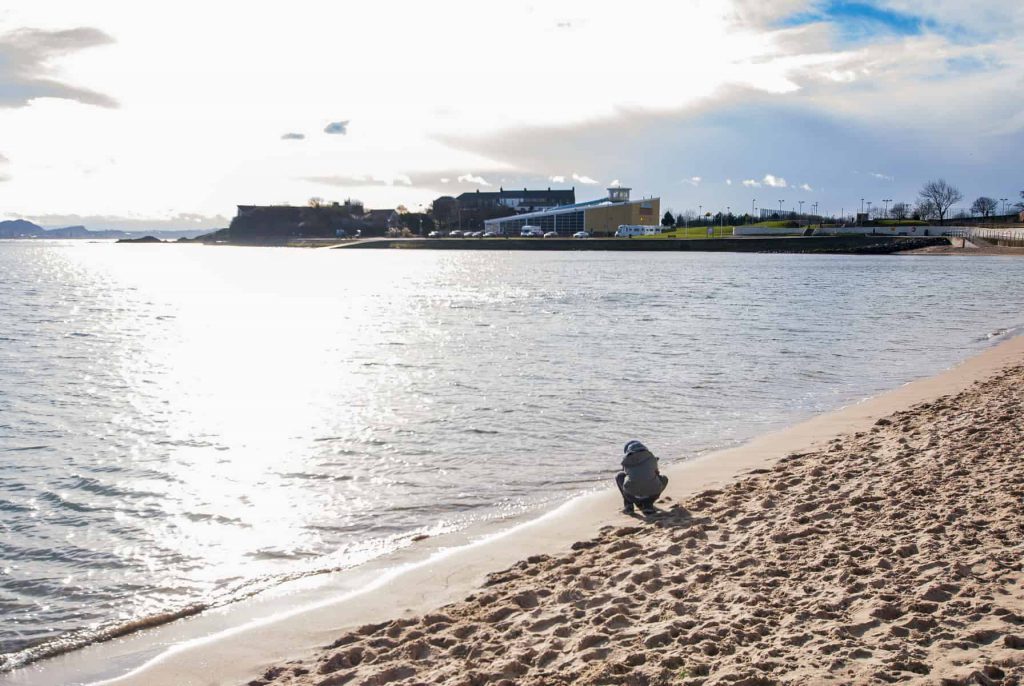
How to keep kids safe on vacation
In busy places like public transportation hubs or downtown areas, getting separated from your children are very real scenarios that we have heard from friends and family on a near monthly basis. While we hope this will never happen to our children, we are not naive enough to believe they are incapable of getting turned around and misplacing us. Because of this, we have made it our priority to have safety and security conversations with our children as we start giving them more freedoms during vacations and even at home.
The conversations don’t have to be long, or painful, but they must be detailed and at a level they understand. Most conversations start when the children ask simple questions about the topic, or they have watched it on tv – as their shows are also trying to keep kids safe in public places. This is how to keep kids safe on vacation.
Most of these conversations revolve around getting lost and how to avoid it, but there is more to safety than just sticking together. There are perfectly well-meaning strangers that often try to give my children food, with or without packaging; there are people that like to stare, touch or take photos of my children because they are blonde and blue-eyed (and just plain adorable, obviously); and then there is keeping them safe from themselves – the number of rocks they are willing to climb to get a better view of something or how close they want to walk near the road just so they can balance on the ledge just about give me a heart attack. Having multiple, meaningful discussions on the topic, as well as daily reminders and a close eye are often all a parent needs to keep them safe in this respect, as I choose to believe none of these people mentioned above have any ill-intent towards my kids, but you can never be too sure.
Respect local customs
While we all have our own opinions about the way we want to be treated while on vacation, on how we dress and how we should behave in public, this isn’t always possible in certain parts of the world. Does it suck? Yes. Should it change? Also yes. But putting yourself and your family at risk to “stick it to the man” isn’t how things change. And it definitely isn’t how one stays under the radar. Just remember, abiding by customs isn’t the same as agreeing with them.
Plan your route each morning
If traveling sans other parent, it is important that they have a general idea of where you will be. If you or your children get lost, at least someone out there knows where to start looking.
On the other hand, it is also important to articulate to the whole party where you are traveling to next. It can be as simple as “after lunch, we are going to the Natural History Museum”. Now, if anyone gets separated, they know for sure that someone will be there waiting. This must be true for the party members that are not lost; if you have said you will be at a specific location and then suddenly realize someone is missing, have a recognizable presence at that location. Children may not associate “separated” with “lost” and therefore will not follow the proper “don’t move” lost procedures. If they know you will be at the museum, simply finding directions to the museum and meeting you there could be their only directive – and of the helpers they have enlisted find you.
Dress in bright colors
Dressing in bright colors makes it easy for parents to spot their children, and for children to spot their parents. In a time where everyone is wearing the fashionable shades, step it up a notch and wear something that stands out of the crowd and gets you noticed (respectfully).
Emergency contact details
The children should have the contact information for the hotel, parents cell phones and at least know how to contact local police. If they do manage to get out of site, they will be able to quickly find a working phone – preferably a business’ phone – and tell you where they are.
For smaller children, there are temporary tattoos available that parents can write important information. It is not only phone numbers that are of importance to small children; allergies are very important to mention in case someone tries to feed your kids while they wait for you to pick them up.
Practice emergency scenarios
Just like practicing a fire drill at school, it is important to review the different scenarios with children and remind them of how to react. Every time we head out into a busy crowd, we review with our 6-year-old, what is he expected to do if he gets lost. What is he expected to do if he boards a train without us, we get separated, or he leaves the train without us?
Take pictures of family
It is hard to remember exactly what you dressed your children in this morning, but taking a group photo before leaving the hotel is a great way to keep that information safe and accurate. Taking them in a fun way can also be part of your routine and souvenir display. Make it fun and less “if you get lost”.
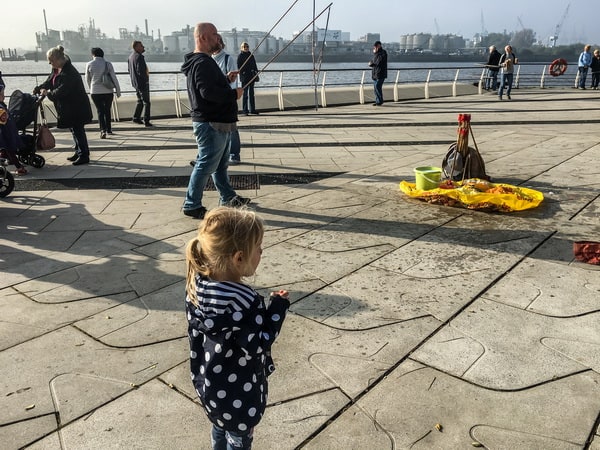
Identify the best people the kids can ask for help
In our house, if the children get lost or separated, they have 3 rules; Don’t move, find a helper, tell them you are lost. A helper is a police officer or a mommy. How do we know they are a mommy? Because they have kids with them. It may be a little sexist, but children are more likely to open up to a friendly female face than a male stranger. At the end of the day, if the kids decide to ask a daddy for help, as long as everyone is back in my arms safely, I don’t care. When we are at Disney, or example, or another place of business where Police are not actively present, we point out the employees. Those uniforms and that badge mean they work here, and they are the first person the kids need to ask for help.
At Disney, if a Cast Member hears a parent explaining these rules, anywhere within the parks, they must stop, wave and introduce themselves to the child so they are familiar with the procedure.
Travel information between both parents
While most parents tend to leave all important documents in moms purse, it is important that both parents have some form of identification or information regarding all the children. This is especially true if parents take turns going out with the kids; kids’ documents are useless with Mom in the hotel if Dad has lost little Jimmy in the parks. Dad needs that information for the police and search team, not Mom.
Keep in eyesight
While this is easier said than done, it does need to be said. Always have an eye on the kids. If you are preoccupied with something, verbally switch responsibilities with another adult and make sure they acknowledge the switch before leaving the children’s side; “I’m running to the window to check the opening hours. You have the kids”
When in busy areas, we have “travel buddies”. I take the baby and hubby takes Munchkin. We have our own zones of responsibility and therefore I can focus my attention on controlling one rambunctious child instead of two. This has the happy accident of meaning we have more one on one time with the kids as we aren’t having to divide our attention between the two, but this also means we are able to enjoy the attraction or location a little more since we have that much less to worry about. This system isn’t for everyone, but it is one example of the many ways we are able to both successfully watch the kids, keep them safe, and enjoy our vacation at the same time.
Water park safety rules
On top of all the other safety rules out there for public and crowded spaces, water park safety rules are that much more important. If the children are not strong swimmers AND cannot reach the bottom of the pool, they must never leave their parent’s side. And parents must never let them leave their sight. Children can walk away or slip and fall all too quickly. A water park is not a place to test boundaries.
There is absolutely zero tolerance for running, getting too far away or horseplay, in a crowded water park. Silly and fun yes. Horseplay, no. There is no way of knowing how far their new found friends will take the game, or how they will react when your kids take it a little too far. Depending on the location, there may or may not be a lifeguard present either. Many water parks and beaches in Europe do not have a lifeguard on duty; everything is “use at your own risk”. Know the policies and adjust your expectations of the children accordingly.
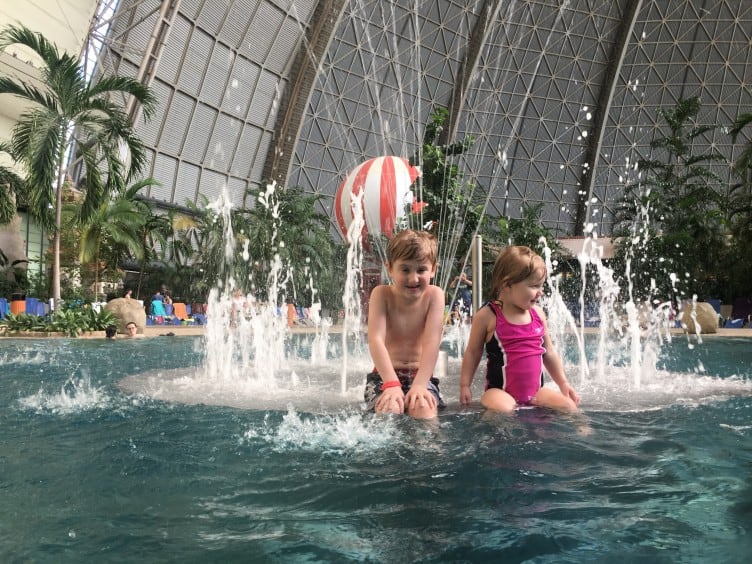
Have a “lost” plan
Tell them exactly what to do if they get lost. This works mostly with older children, as the little ones will find “Don’t move, find a helper, tell them you are lost” hard enough to remember. In theme parks or shopping malls, for example, have a set meeting place in case you get separated. They are to meet you there as soon as they realize you are not by their side and they can not leave that place without a parent.
If the older kids have a cell phone, make sure the minutes have not expired and they are capable of texting. They are still required to meet at the meeting place, but at least this way there is less panic while you, the parent, are making your way to said place.
What if they get lost
If they do manage to slip away, all hope is not lost. They will be found; either in a few minutes or in an hour, but they will be brought home safely and probably more scared than you are. There are very important things to remember when you discover your child is no longer by your side.
First of all, they are probably just lost and nothing bad has happened to them. While the media has a duty to broadcast each and every single kidnapping, in order to bring the children safely home, it does make it sound like this is happening a lot more often than it actually is. The statistics of a child being kidnapped are very low, and by a complete stranger are even lower. Television tends to overinflate those numbers as well. They are just lost and will be found.
Even when parents know how low the chances are that their child will be kidnapped, they still fear kidnappings, the Denver Post reported in 2010. The myth of frequent kidnappings is so ingrained in parents’ minds that they just can’t get over it, even when they know it’s based on misinformation.
Secondly, find a helper. Just as your children have been instructed, so should you. Find someone that works at the Parks, or a nearby Police officer, even a local business person, and ask them for help finding your child. They may have seen them wandering into a store while you weren’t looking.
Thirdly, don’t move. Have someone from the group stay exactly where you last saw the child. If they are old enough to articulate surroundings, the helper facilitating your child could be bringing them back to you just as you are walking away to find them. Stop moving.
Fourth. Stay calm, and collected. They will not be returned faster if you having a panic attack. Call friends and family to help you look and be sure to keep a close eye on the rest of the children – they may have an idea of where the lost child is hiding and will want to investigate as soon as they get the chance. Keep older children informed, as to not scare them.
Reassure them once found
The last thing your scared child needs is to be scolded after being found. They will not learn to stay close to you or to pay better attention to their surroundings; they will only learn to not be found next time, in order to avoid punishment. Reassure your child that they are safe, and they did the right thing finding help and staying calm. Remind them that they are not in trouble, but do use this opportunity as a teachable moment.
When the time is right, review – calmly – what went wrong and what could have been done to avoid the situation. This will take a lot of personal reflection on the part of the child and the parent; unless they purposefully distracted you in order to run away, there is some accountability on the part of the parents as well. A teachable moment should never end with one or both parties being left in fear or paranoid about future outings. This is simply a time to reflect on what went wrong and to make promises to never let it happen again. There is no reason to avoid going out in public, as these things just happen. Perhaps tightening up on the freedoms the children have when in public, like how far they are allowed to walk away or even walking without holding a parents hand, would be a good compromise, and they can earn back their freedoms when everyone believes a lesson on safety has been learned.
You may also like:
- Disneyland Paris Planning Guide
- Toughest Things About Traveling in Europe with Kids
- The Ugly Side Of Traveling With Kids
- Best Packing Tips to Feel More Organized + Less Stressed
